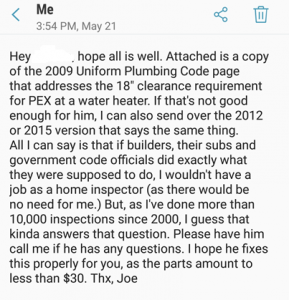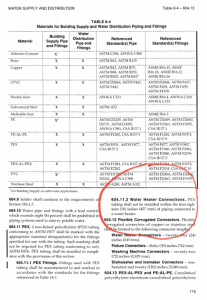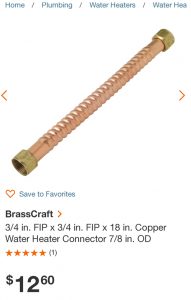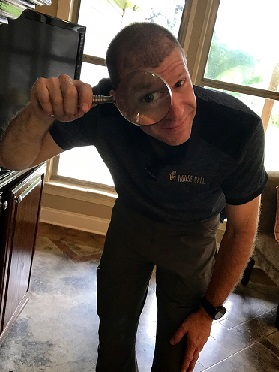Working in any part of the real estate industry has its challenges, but (in my opinion) the most difficult part has to be the negotiations that occur between the buyer and seller after the completion of a home inspection. (And I’m not just saying that because I’m a home inspector.) For real estate agents, this can be a nightmare situation. They must try to balance the wishes of the buyers with the reality of the seller’s financial position. Unfortunately, egos become involved; feelings can get hurt and (all too often) contractors and home inspectors come in and muddy the waters by providing contrary opinions of the situation.

It’s enough to drive someone to drink.
What happens when problems are found
There are no perfect houses, and problems (or perceived problems) will be found on every single home inspection. Many different factors influence how the findings of a home inspection report will affect the sale of a property, and these variables change from person to person and from sale to sale. The number of years of experience that a person has in the industry, their personality, level of knowledge, temperament, motivation, education, level of maturity and self-confidence all play a role in how they will behave in the contentious situation that is a real estate negotiation.
Ultimately, the experience level of the individuals involved (real estate agent, inspector, buyer, seller, appraiser, underwriter, insurance broker, etc.) will determine how smoothly each individual deal will progress.
Doing your job well
A home inspector should do their job well, covering all their bases during the inspection consultation and providing a well-written and easy to understand inspection report. If they do this (and an experienced real estate agent is involved), it is rare that the home inspector becomes involved in negotiations. If clear and concise information is provided in the report, a professional real estate agent is typically able to handle the negotiations without any problems.
But whenever human beings are involved, there will always be some level of uncertainty that creeps into any process. Maybe one of the agents will be new; maybe the buyers will ask for unrealistic concessions; maybe the sellers will have an oversized opinion of the value of their property; or maybe one (or all) of the people involved in the sale will be engineers…

The point is that things happen and problems occur. Real estate professionals should be ready for these situations, anticipating the different roadblocks that may come up. They should have potential solutions already mapped out in their minds, so they are ready to tackle any of these issues that may arise.
Set yourself up
The longer you work in any industry, the more easily you will be able to discern its patterns. Each profession has certain things that happen on a regular, repeating basis, and real estate is no exception. Every buyer will go through a similar process, from their first contact with an agent to when they drive away from the title company’s office with the keys to their new home in hand.
Experienced professionals are familiar with each of the different hurdles and roadblocks that come up during this process and are prepared to deal with them as a matter of consequence.
Being adequately prepared for all the problems and idiosyncrasies that are going to present themselves during a real estate transaction is the sign of an experienced service provider. Knowing what happens next, having answers to the questions that are coming before they’re asked and having the necessary documentation ready at a moment’s notice is what separates the professionals from the pretenders. By always being ready for what comes next, you can set yourself (and everyone else involved) up for success.
Being ready as a home inspector
For home inspectors, this means being ready for the questions that are inevitably going to come up in the transaction process. You don’t necessarily need to have the answers on the tip of your tongue, but you need to know what to look for and where to find them. In order for us to be “always at the ready,” we need to keep ourselves abreast of our constantly growing, changing and evolving industry.
Continuous education is not just the name of the classroom hour requirement you must fulfill each year to renew your license or membership. Continuous education should be your mantra; constant learning should be your objective. In order to keep your business and career growing, you must keep learning. To paraphrase Dan Kennedy from his book “The Ultimate Marketing Plan”: There are only two types of businesses: ones that are growing and getting better and ones that are resting on their laurels and getting worse.
One of the things I’ve been doing recently to better my product as a home inspector is attempting to learn more about the various codes that affect how a house is built (and why it’s constructed in a certain manner.) Some inspectors will argue that it’s not a requirement for home inspectors to know codes, and they would be correct. I cannot argue with their premise. However, my reply would be that in order to get a driver’s license, you are not required to know how to change your oil, put on a spare tire or fill the windshield wiper fluid in your car. But no one can refute the fact that having this additional knowledge can certainly serve you well and will come in handy in various situations.

More (knowledge) is always better. Don’t let anyone tell you otherwise.
Real life example
As an example of this, let me tell you about a recent inspection where all my additional research proved to be worth the effort.
I inspected a three-year old home for the seller, who was about to put it on the market and wanted to be sure that there would be no hiccups with any upcoming inspections. It was a fairly straightforward inspection, as the home was still almost brand new. I did discover a few minor deficiencies during my inspection and relayed my findings to the homeowner. She informed me that she was friends with the general contractor that built the house and would be talking to him later that evening to see if he would be willing to fix the issues that I’d uncovered.
It turns out that he was willing to make most of the (minor) repairs needed to head off any future home inspection problems, which made her happy. The one issue that he balked at was a piping issue at the water heater. I noted in my report that the PEX water lines were piped directly to the top of the water heater and were not protected from the heater by 18” of copper piping, as required by the Uniform Plumbing Code (UPC).
(Please note that I do not quote code in my home inspection reports, as I am not a certified code inspector. I simply describe any deficiencies that I discover and recommend that they are corrected to comply with “current safety standards.”)
Apparently, the contractor had consulted with his plumber, who told him the code that I was referencing must have been something new, as the 18” of copper piping was not a requirement three years ago when the home was built. He even included the requisite line (that they always use) about how if it wasn’t originally done to code, then the local building official would’ve never passed it on his inspection. (They really love using that one, don’t they!)
Backing up your inspection findings
I knew (from my additional reading/continuing education), the 18” clearance requirement has been in effect for many years. I told my client (the home owner) that I would do a little research and get back to her with some ammunition that she could use to get her problem rectified.
With a minimal amount of research (conducted entirely on my cell phone), I was able to pull up some of the most recent versions of the UPC to back up my findings. I took a screen shot of the code in question and included it in my text message to her later that evening. I even included a screen shot of the parts needed for repair, just to make things easier for this obviously overworked plumber (just because I’m nice that way…)
Below are the text messages that I forwarded to the contractor (by way of my client):



Knowing what you need to do and how to do it are traits of an experienced professional, and it makes the whole process flow smoothly for everyone involved. There is no better way to grow your sphere of influence than having the right answers (or knowing where to find them) whenever they’re needed.
It’s what you learn after you know it all that counts.
John Wooden
So what do you think? Is it worth spending extra time advancing your knowledge beyond what’s required? Does it really benefit your business?
Please leave a comment below to let me know what extra work you do to make sure you provide a better product for your clients.
Please Share with Friends!
Thanks, Joe

